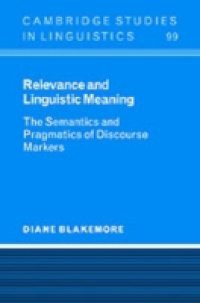The importance of discourse markers (words like 'so', 'however', and 'well') lies in the theoretical questions they raise about the nature of discourse and the relationship between linguistic meaning and context. They are regarded as being central to semantics because they raise problems for standard theories of meaning, and to pragmatics because they seem to play a role in the way discourse is understood. In this new and important study, Diane Blakemore argues that attempts to analyse these expressions within standard semantic frameworks raise even more problems, while their analysis as expressions that link segments of discourse has led to an unproductive and confusing exercise in classification. She concludes that the exercise in classification that has dominated discourse marker research should be replaced by the investigation of the way in which linguistic expressions contribute to the inferential processes involved in utterance understanding.

